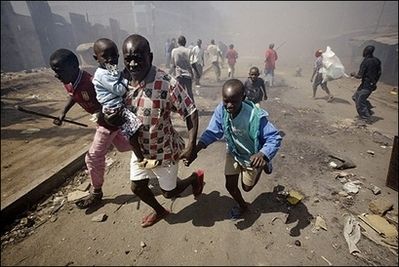Kenya riots claim 300 more after poll
Updated: 2008-01-02 08:04
NAIROBI -- At least 35 children and adults sheltering in a church were burnt alive by an angry mob in Kenya Tuesday, as an eruption of election violence threatened to tip over into a full-scale tribal conflict.
|
|
The horrific deaths near the western town of Eldoret bring to more than 300 the number of people killed since December 27 presidential elections, which were narrowly won by the incumbent Mwai Kibaki amid allegations of vote-rigging by his defeated opposition challenger, Raila Odinga.
The violence is the worst Kenya has witnessed since a failed 1982 coup.
With Kibaki belonging to Kenya's largest tribe, the Kikuyu, and Odinga to the second largest, the Luo, the violence has taken on a distinctly ethnic hue, with tit-for-tat killings and targeted arson attacks.
The victims of Tuesday's blaze were among some 400 people who had taken refuge in the church in order to escape escalating tribal clashes, survivors and police said.
They said an angry mob doused the Kenya Assemblies of God Church with petrol before lighting it.
"At least 35 people were burned to death in the church, some beyond recognition. They included women and children," Abbass Gulled, secretary general for Kenya's Red Cross official, said.
Dead bodies were found twisted among iron sheets and half-burnt wooden pews covered in ash and scattered with the belongings of the victims.
Earlier Tuesday, EU monitors said the elections had "fallen short" of international standards and urged an independent audit of the results, thus increasing diplomatic pressure on Kibaki.
And the head of Kenya's electoral commission said his speedy announcement of the president's disputed reelection -- despite pressure by European envoys and the state-owned human rights commission to delay the announcement until a probe was carried out -- had been made under pressure from the ruling Party of National Unity.
"I was being pushed from many sides...then I made a decision at once," commission chief Samuel Kivuitu told reporters.
For his part Kibaki, 76, said in a statement "that leaders of political parties should meet immediately and publicly call for calm."
But Odinga said he would only talk once the president had acknowledged electoral fraud.
While declaring that "the killing must stop," Odinga also vowed to press ahead with a mass rally in Nairobi on Thursday at which he plans to have himself inaugurated the "people's president."
A second consecutive night and day of conflict left more than 110 dead on Tuesday, with no end in sight to the unrest that has plunged one of Africa's more stable democracies into an unprecedented crisis.
According to a tally compiled by AFP, 301 people have died in politically related-violence since polling day.
In the worst-hit region of western Kenya, some 70,000 people have been displaced by the unrest, according to the Red Cross, with head Gulled describing the situation as a "national disaster."
"What I saw was unimaginable and indescribable," he said after visiting several areas torn by post-election violence.
Aerial video footage taken by the humanitarian group showed hundreds of houses on fire, farms set ablaze and road blocks every 10 kilometres (six miles).
Gullet said only those from "the right ethnic group" were allowed through the barricades.
Ugandan officials also reported hundreds of Kikuyu tribespeople crossing the border from Kenya.
In London, Kenya's former colonial ruler Britain sought to bring its diplomatic muscle to bear, backing Commonwealth and African efforts to resolve the political standoff.
Prime Minister Gordon Brown said he had spoken by telephone to both Kibaki and Odinga, urging them to work together and explore the possibility they could "come together in government."
"But the first priority is that the violence is brought to an end. It is unacceptable that lives are being lost," Brown said.
The African Union said it was "seriously preoccupied" with the upsurge of violence and urged all sides "to be calm and to resort to dialogue".
Nairobi slum areas were overrun by rioters burning down shops belonging to members of the Kikuyu tribe and looting anything from refrigerators to basic goods.
"The big men are fighting it out over the election, but if a compromise is not reached soon, we will just be left here to die," said 63-year-old John Okwiri, clasping a mangled container cap, the only object he could salvage from his little coffee shop.
"One tribe is targeting another one in a fashion that can rightly be described as ethnic cleansing," said one senior police commander who declined to be identified.
The darling of foreign investors in east Africa, with an average annual growth over five percent over the past five years, Kenya will be lucky to emerge unscathed in an increasingly competitive regional scene.
|
|
|
||
|
||
|
|
|
|
